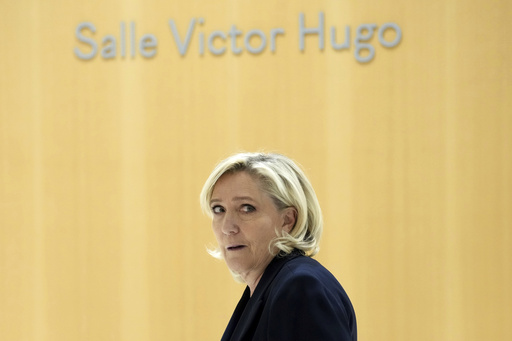
PARIS — Marine Le Pen has dedicated significant effort in recent weeks to combat what she deems unjust accusations regarding her party’s alleged misuse of European Parliament funds. As a prominent far-right politician in France, she now confronts a pivotal trial that could impact her prospects for the presidency in 2027.
During the trial, set to conclude on November 27, Le Pen anticipates a guilty ruling as prosecutors prepare to summarize their case and suggest a penalty. The National Rally, along with 25 of its officials, is implicated in utilizing European Union funds designated for parliamentary aides to pay party staff from 2004 to 2016, which goes against EU regulations. Notably, during that period, the party was known as the National Front.
On her way to the courtroom last week, Le Pen extended her best wishes to Donald Trump via a message on X, perhaps drawing parallels to Trump’s resilience in light of his felony conviction earlier this year, which did not deter his political aspirations.
From the trial’s outset, Le Pen has exhibited a strong presence, consistently occupying a front-row seat, attending lengthy sessions, and visibly expressing her frustration over the allegations she claims are unfounded. With a legal background, she diligently follows the proceedings, often showing her disagreement through visible gestures.
If Le Pen and her co-defendants are found guilty, they could face penalties of up to 10 years in prison and fines reaching 1 million euros ($1.1 million) each. However, Le Pen’s primary concern has recently shifted toward the possibility of being declared ineligible to run for office. A related case involving a centrist party earlier this year resulted in fines and suspended sentences.
In discussions with her legal team, Le Pen has been assessing the implications of a potential ruling that could significantly obstruct her plans for another presidential campaign. After being the runner-up to President Emmanuel Macron in the last two elections, Le Pen’s party has seen a rise in electoral support in recent years.
Speaking with the press outside the courthouse, Le Pen seemed to brace for a possible guilty verdict, referring to such an outcome as predictable but asserting that she would not waver in her political ambitions.
“I feel we didn’t succeed in convincing you,” she remarked to the panel of judges last week, delivering a detailed one-and-a-half-hour argument interspersed with politically charged statements aimed at the numerous journalists in attendance.
Le Pen rejected the notion that she orchestrated a system designed to misappropriate EU funds for party gain, asserting instead that the aides’ tasks were structured to align with the differing activities of the Members of the European Parliament (MEPs), including pivotal political assignments.
“The role of a parliamentary aide is broad,” she contended. “It does not define the job performed, whether that be secretarial, legal, consulting, or even providing security.”
Many of her co-defendants, who owe their careers to her, provided testimony under her careful scrutiny. At times, aides appeared flustered and struggled to connect their work specifically to EU parliamentary duties.
Le Pen could frequently be heard clarifying or adjusting points made by others, even during their turn to speak. Occasionally, she would punctuate their remarks with a pronounced “voilà” to assert her agreement with them.
She emphasized that the party had never received a complaint from the Parliament until a 2015 warning was issued by former European Parliament President Martin Schulz, who alerted French authorities regarding potential fraudulent activities by her party members.
“Let’s look back,” Le Pen stated, insisting that either the existing regulations were lenient or nonexistent at the time.
She expressed concern that the court might interpret the party’s conventional practices, which she believes were legitimate, incorrectly. “It’s unjust,” she reiterated, citing a metaphor about misinterpretation leading to broader suspicion.
Bénédicte de Perthuis, the presiding judge, emphasized that despite the political implications, the court’s focus should remain on legal principles. “Ultimately, the key question is whether parliamentary aides worked for their MEPs or for the National Rally,” she clarified.
Patrick Maisonneuve, representing the European Parliament, estimated the financial implications of the alleged embezzlement to be around 4.5 million euros, claiming that the evidence of fraud has become increasingly apparent in recent weeks. He remarked that some defendants seemed to have been coached to provide uniform responses to protect Le Pen.
In her final statement before prosecutors present their argument, Le Pen urged the judges to evaluate the evidence supporting her innocence. “The court might note our disorganization… but that does not constitute a crime,” she concluded.
